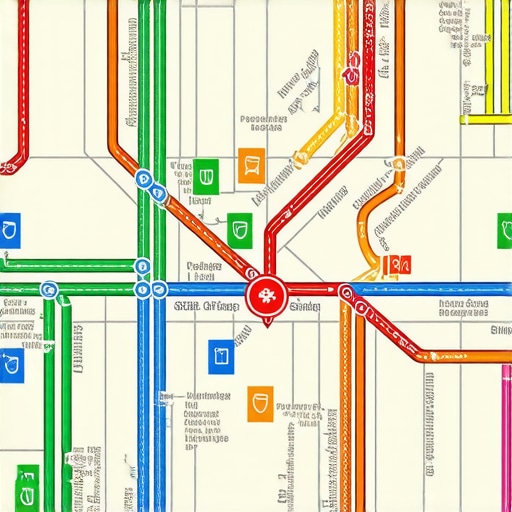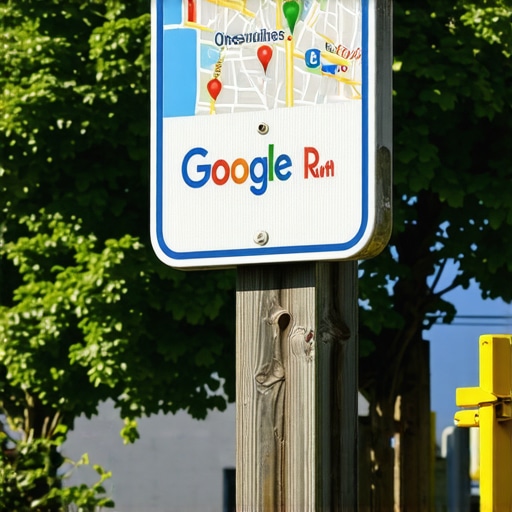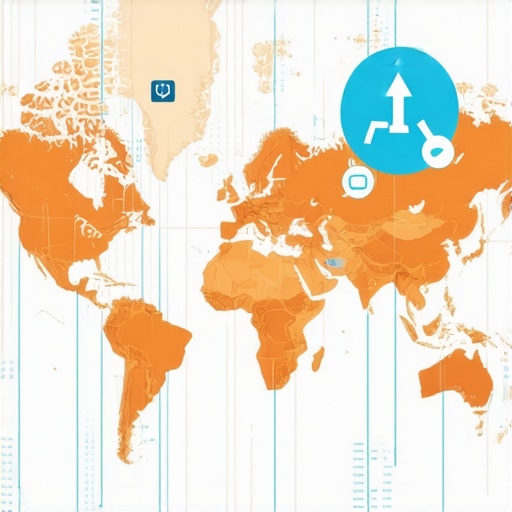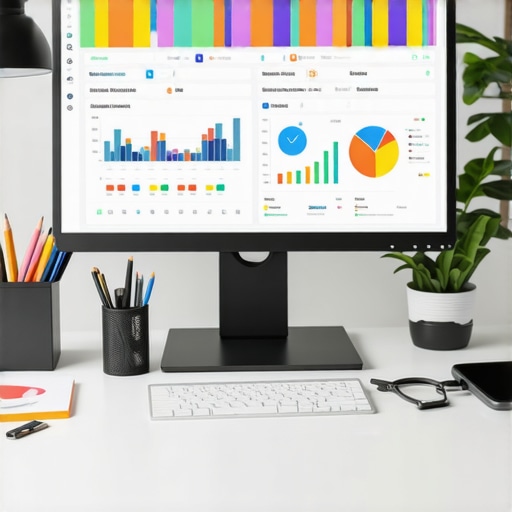Unlocking the Power of Maps SEO: A Strategic Perspective for 2024
In an era where local searches account for over 46% of all Google queries, mastering Maps SEO is no longer optional but essential for digital dominance. As search algorithms evolve, so must our understanding of how to optimize geographic visibility effectively. This comprehensive guide explores the nuanced, expert-level strategies that elevate your Google Maps ranking and ensure authoritative local presence.
The Interplay of Local Search Algorithms and User Intent
Understanding the sophisticated mechanics of Google’s local search algorithms is paramount. Core factors such as relevance, distance, and prominence form the triad that influences visibility. However, recent updates have integrated machine learning to better interpret user intent, demanding a more refined approach to optimization. Leveraging structured data, local keywords, and user-generated content can significantly enhance relevance scores, aligning your listings with nuanced search queries.
Technical Foundations: Building a Robust Local SEO Infrastructure
At the technical level, ensuring your Google My Business (GMB) profile is meticulously optimized is foundational. Prioritize consistent NAP (Name, Address, Phone Number) citations across authoritative directories, and implement schema markup for local business details. Additionally, optimizing your website’s local landing pages with geo-specific keywords and fast-loading, mobile-friendly design are critical for maintaining technical credibility and user engagement.
Advanced Content Strategies for Map Visibility Enhancement
Content remains king, especially when tailored for local SEO. Develop authoritative blog posts and case studies that include rich media, such as maps and infographics, to demonstrate expertise in your niche. Incorporate LSI keywords like “local SEO techniques,” “Google Maps ranking factors,” and “geolocation strategies” naturally within your content. These augment semantic relevance and improve your chances of ranking higher in local packs.
Expert Insights: Navigating the Grey Areas of Maps SEO
How can businesses effectively manage conflicting local signals in competitive markets?
Balancing conflicting signals—such as inconsistent NAP data or competing reviews—requires a strategic, multi-pronged approach. Regular audits, proactive review management, and authoritative citations can harmonize your local signals. For highly competitive sectors, leveraging niche-specific keywords and personalized content can differentiate your listing. Consulting authoritative sources like Moz’s local SEO guidelines can provide further insights into best practices.
For deeper insights into advanced Maps SEO strategies, explore our detailed comprehensive guide. Engaging with industry peers through forums and professional networks also fosters innovative tactics and shared success stories.
To stay ahead of emerging trends, consider integrating AI-driven local search analytics, which can predict shifts in user behavior and algorithm updates before they impact your rankings.
Harnessing the Power of Local Authority and Trust Signals
One often overlooked facet of advanced Maps SEO is the significance of local authority and trust signals. These include backlinks from reputable local websites, active participation in community events, and high-quality local reviews. Search engines increasingly weigh these signals when determining local relevance and prominence. To harness this, businesses should develop strategic partnerships with local influencers, sponsor community initiatives, and foster genuine customer engagement, all of which contribute to a more authoritative local profile.
Implementing Voice Search Optimization for Local Queries
With the surge in voice-activated searches, optimizing for conversational, long-tail keywords becomes critical. Voice searches tend to be more natural and question-based, often involving local intent—for example, “Where can I find the best coffee shop near me?” To capitalize on this trend, ensure your local content answers specific questions, uses natural language, and is optimized for featured snippets. Incorporating schema markup for FAQs can also improve your chances of appearing in voice search results, thus boosting your Maps visibility.
Optimized local landing pages with schema markup and engaging multimedia content enhance user experience and search engine understanding. Consider integrating maps, customer testimonials, and localized images to improve relevance and engagement.
What Are the Hidden Factors Influencing Local Pack Rankings?
Beyond traditional signals, recent research indicates that factors such as behavioral signals—like click-through rates, dwell time, and conversion rates—play a vital role in local pack rankings. These metrics reflect user satisfaction, prompting Google’s algorithms to favor listings that provide valuable, relevant experiences. Moreover, maintaining a consistent online presence across various platforms and ensuring your Google My Business profile is dynamically updated can influence these behavioral signals positively. For an in-depth analysis of these nuanced factors, consult authoritative sources like Moz’s local SEO guidelines (Moz’s comprehensive insights).
If you’re interested in pushing your local search dominance further, sharing your experiences or asking questions in our community comments can spark valuable discussions. Also, exploring our latest Maps SEO strategies can provide actionable tactics tailored for 2024 challenges.
Deciphering the Impact of Behavioral Metrics on Local Pack Algorithms
While traditional signals like NAP consistency and review quality set the foundation for local SEO, recent developments highlight the importance of behavioral metrics such as click-through rate (CTR), dwell time, and conversion rate. These signals act as proxies for user satisfaction, effectively influencing Google’s algorithm to favor listings that demonstrate engagement and relevance. For instance, a rise in CTR from search results indicates to Google that your listing resonates with user intent, potentially boosting your rank. Similarly, longer dwell times suggest that users find your content valuable, reinforcing your local authority.
To leverage these signals, businesses should focus on optimizing their Google My Business (GMB) listings with compelling titles and descriptions that entice clicks, coupled with clear calls-to-action. Implementing structured data to enhance your snippets can also improve search result visibility, thereby increasing CTR. Additionally, maintaining an active online presence through timely responses to reviews and frequent updates can positively influence user engagement metrics.
The Nuances of Schema Markup and Rich Snippets for Local SEO
Schema markup remains an underutilized yet powerful tool for local SEO mastery. By embedding detailed structured data into your website, you enable search engines to better understand your content’s context, which can lead to enhanced rich snippets in search results. For example, adding schema for local business details, events, or product offerings can display additional information like ratings, availability, or event dates directly in the search results, capturing user attention and driving higher engagement.
Advanced practitioners often utilize JSON-LD format for schema implementation, ensuring compatibility and ease of updates. Moreover, combining schema with multimedia elements such as videos, images, or 3D tours can significantly enrich your listings, making them more appealing and informative. This holistic approach to structured data not only improves your visibility but also enhances user experience, ultimately translating into higher local pack rankings.
How Can Local Link Building Be Strategically Elevated in Competitive Markets?
In highly competitive local markets, traditional link-building tactics often fall short. Instead, a sophisticated, relationship-driven approach is required. Building backlinks from authoritative local sources—such as industry associations, local news outlets, and community organizations—not only boosts your domain authority but also signals local relevance to search engines.
To achieve this, consider sponsoring local events or webinars and securing backlinks through press releases or partnerships. Content marketing plays a pivotal role; creating in-depth, locally-focused resources like neighborhood guides, case studies, or success stories can attract organic links and social shares. Engaging with local influencers and participating actively in community initiatives can also generate valuable mentions and backlinks, reinforcing your prominence within the local digital ecosystem.
What are the most effective ways to monitor and adapt to algorithm shifts in local SEO?
Staying ahead in local SEO necessitates vigilant monitoring of algorithm updates and shifts in user behavior. Tools like SEMrush Sensor or MozCast can track fluctuations in local search rankings, providing early indicators of algorithm changes. Regular audits of your GMB profile, website analytics, and local citations help identify potential issues or opportunities.
Adapting strategies involves maintaining flexibility—experimenting with new content formats, updating schema, or refining your keyword targeting based on emerging trends. Participating in industry forums, subscribing to authoritative SEO blogs, and engaging in local SEO communities foster knowledge sharing and best practices. Ultimately, an agile, data-driven approach ensures your business remains resilient and competitive amidst evolving search landscapes.
Harnessing Local Authority Through Authentic Community Engagement
Building local authority extends beyond backlinks; it encompasses genuine community engagement that fosters trust and credibility. Establishing strategic partnerships with local influencers, sponsoring community events, and actively participating in local initiatives can elevate your reputation. These actions generate authentic reviews, mentions, and backlinks, which search engines interpret as signals of trustworthiness and relevance.
Additionally, leveraging user-generated content—such as customer stories, testimonials, and local reviews—can organically enhance your local profile. Encouraging satisfied customers to share their experiences on various platforms increases your visibility and reinforces your local authority. This holistic approach creates a virtuous cycle: community involvement drives trust, which improves engagement metrics, thereby positively influencing your Maps SEO rankings.
Future-Proofing Your Local SEO Strategy with AI and Data Analytics
Looking ahead, integrating artificial intelligence (AI) and advanced data analytics into your local SEO arsenal offers a competitive edge. AI-powered tools can analyze vast amounts of behavioral data, predict shifts in user preferences, and recommend optimization tactics proactively. For example, predictive analytics can identify emerging local search trends, enabling you to tailor your content and outreach efforts accordingly.
Moreover, AI-driven sentiment analysis can gauge public perception and review sentiment, informing reputation management strategies. Businesses that harness these technologies can adapt swiftly to algorithm updates and changing consumer behaviors, ensuring sustained visibility and relevance in local search results.
To deepen your understanding, consider exploring authoritative resources like BrightLocal’s Local Search Grid, which provides insights into emerging local SEO trends and tools. Embracing these innovations now sets the stage for long-term dominance in local search landscapes.
Deciphering the Impact of Behavioral Metrics on Local Pack Algorithms
While traditional signals like NAP consistency and review quality set the foundation for local SEO, recent developments highlight the importance of behavioral metrics such as click-through rate (CTR), dwell time, and conversion rate. These signals act as proxies for user satisfaction, effectively influencing Google’s algorithm to favor listings that demonstrate engagement and relevance. For instance, a rise in CTR from search results indicates to Google that your listing resonates with user intent, potentially boosting your rank. Similarly, longer dwell times suggest that users find your content valuable, reinforcing your local authority.
To leverage these signals, businesses should focus on optimizing their Google My Business (GMB) listings with compelling titles and descriptions that entice clicks, coupled with clear calls-to-action. Implementing structured data to enhance your snippets can also improve search result visibility, thereby increasing CTR. Additionally, maintaining an active online presence through timely responses to reviews and frequent updates can positively influence user engagement metrics.
The Nuances of Schema Markup and Rich Snippets for Local SEO
Schema markup remains an underutilized yet powerful tool for local SEO mastery. By embedding detailed structured data into your website, you enable search engines to better understand your content’s context, which can lead to enhanced rich snippets in search results. For example, adding schema for local business details, events, or product offerings can display additional information like ratings, availability, or event dates directly in the search results, capturing user attention and driving higher engagement.
Advanced practitioners often utilize JSON-LD format for schema implementation, ensuring compatibility and ease of updates. Moreover, combining schema with multimedia elements such as videos, images, or 3D tours can significantly enrich your listings, making them more appealing and informative. This holistic approach to structured data not only improves your visibility but also enhances user experience, ultimately translating into higher local pack rankings.
How Can Local Link Building Be Strategically Elevated in Competitive Markets?
In highly competitive local markets, traditional link-building tactics often fall short. Instead, a sophisticated, relationship-driven approach is required. Building backlinks from authoritative local sources—such as industry associations, local news outlets, and community organizations—not only boosts your domain authority but also signals local relevance to search engines.
To achieve this, consider sponsoring local events or webinars and securing backlinks through press releases or partnerships. Content marketing plays a pivotal role; creating in-depth, locally-focused resources like neighborhood guides, case studies, or success stories can attract organic links and social shares. Engaging with local influencers and participating actively in community initiatives can also generate valuable mentions and backlinks, reinforcing your prominence within the local digital ecosystem.
What are the most effective ways to monitor and adapt to algorithm shifts in local SEO?
Staying ahead in local SEO necessitates vigilant monitoring of algorithm updates and shifts in user behavior. Tools like SEMrush Sensor or MozCast can track fluctuations in local search rankings, providing early indicators of algorithm changes. Regular audits of your GMB profile, website analytics, and local citations help identify potential issues or opportunities.
Adapting strategies involves maintaining flexibility—experimenting with new content formats, updating schema, or refining your keyword targeting based on emerging trends. Participating in industry forums, subscribing to authoritative SEO blogs, and engaging in local SEO communities foster knowledge sharing and best practices. Ultimately, an agile, data-driven approach ensures your business remains resilient and competitive amidst evolving search landscapes.
Harnessing Local Authority Through Authentic Community Engagement
Building local authority extends beyond backlinks; it encompasses genuine community engagement that fosters trust and credibility. Establishing strategic partnerships with local influencers, sponsoring community events, and actively participating in local initiatives can elevate your reputation. These actions generate authentic reviews, mentions, and backlinks, which search engines interpret as signals of trustworthiness and relevance.
Additionally, leveraging user-generated content—such as customer stories, testimonials, and local reviews—can organically enhance your local profile. Encouraging satisfied customers to share their experiences on various platforms increases your visibility and reinforces your local authority. This holistic approach creates a virtuous cycle: community involvement drives trust, which improves engagement metrics, thereby positively influencing your Maps SEO rankings.
Future-Proofing Your Local SEO Strategy with AI and Data Analytics
Looking ahead, integrating artificial intelligence (AI) and advanced data analytics into your local SEO arsenal offers a competitive edge. AI-powered tools can analyze vast amounts of behavioral data, predict shifts in user preferences, and recommend optimization tactics proactively. For example, predictive analytics can identify emerging local search trends, enabling you to tailor your content and outreach efforts accordingly.
Moreover, AI-driven sentiment analysis can gauge public perception and review sentiment, informing reputation management strategies. Businesses that harness these technologies can adapt swiftly to algorithm updates and changing consumer behaviors, ensuring sustained visibility and relevance in local search results.
To deepen your understanding, consider exploring authoritative resources like BrightLocal’s Local Search Grid, which provides insights into emerging local SEO trends and tools. Embracing these innovations now sets the stage for long-term dominance in local search landscapes.
Expert Insights & Advanced Considerations
1. Integrate AI-Powered Analytics for Predictive Optimization
Harness the potential of AI-driven tools to analyze behavioral signals like CTR, dwell time, and conversion rates, enabling proactive adjustments to your local SEO strategy. This forward-looking approach ensures sustained visibility amid evolving algorithms.
2. Prioritize Local Authority Through Community-Driven Engagement
Establish authentic connections with local influencers and participate in community initiatives. These efforts generate high-quality backlinks and reviews, reinforcing your reputation and relevance in local search results.
3. Optimize for Voice Search with Natural Language Content
Align your content with conversational queries typical of voice searches. Use schema markup for FAQs and ensure your local content addresses common questions, capturing voice-driven traffic and enhancing Maps visibility.
4. Leverage Rich Snippets and Schema Markup for Enhanced Listings
Implement JSON-LD schema to embed detailed structured data about your business, such as ratings, events, and product info. This not only improves search appearance but also attracts more clicks, boosting your local pack ranking.
5. Monitor Algorithm Shifts with Advanced SEO Tools
Employ tools like MozCast or SEMrush Sensor to detect fluctuations in local rankings. Regular audits and flexible strategies allow you to adapt swiftly to algorithm updates, maintaining a competitive edge.
Curated Expert Resources
- Google’s Official Local Search Quality Guidelines: The definitive source for understanding ranking factors and best practices directly from Google.
- Moz’s Local SEO Guide: Provides in-depth insights into local search ranking signals, citation management, and reputation optimization.
- BrightLocal’s Local Search Grid: Offers comprehensive data and trend analysis to inform strategic decisions in local SEO.
- Schema.org: The authoritative resource for implementing structured data to enhance search listings.
- SEO Roundtable Blog: Regular updates on algorithm changes and industry trends affecting local search.
Final Expert Perspective
Mastering Maps SEO in 2024 demands a sophisticated blend of predictive analytics, community engagement, and technical precision. By integrating AI insights, optimizing for voice and rich snippets, and continuously monitoring algorithm shifts, your local search presence can reach new heights of authority and visibility. Dive deep into these resources, refine your strategies, and don’t hesitate to contribute your insights—advancement is a collective effort. For advanced strategies and ongoing updates, explore our dedicated Maps SEO resource hub.




